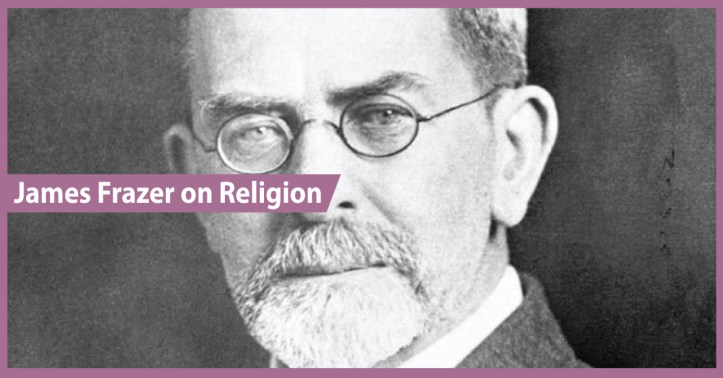James Frazer (1854-1941) was a Scottish social anthropologist who authored the well-known work The Golden Bough (1890), a twelve-volume collection of materials on the so-called “savage mind.”
Frazer’s book had several purposes. It was a reconstruction of the sequential history of the modes of human thought (of which he gave three: magic, religion, science), was an attempt to provide a description of the “chemistry of the mind” that would propel forward the journey of human progress, and also an examination of religious phenomenon as he saw it practiced in the historical record as well as within his own time of writing. He proposed an evolutionist view of religious thought and consciousness arguing that magic, religion, and science belonged to an evolutionary sequence. He attempted to show that human intelligence formed progressively, and he thought that cognitive development, stemming from the beginning of time to the present (which Frazer refers to as a “chain”), could be measured. The thoughts of the earliest human beings contained the content from which more complex ideas evolved and developed.
Frazer was fascinated with the topic of magic and the historical relations of magic and religion, and wished to learn how it came into being and what its fundamental differences to religion were. He argued that magic was the attempt to manipulate or control natural forces through ritual, ceremony, and incantation, all common practices among primitive people for which he offered numerous examples. Magic, he argued, morphed into religion when the earliest humans realized that magic rituals did not work and thus they cultivated a reliance on supernatural beings,
“In the actors mind magic is gradually superseded by religion, which explains the succession of natural phenomena as regulated by the will, the passion or the caprice of spiritual beings like man in kind, though vastly superior to him in power.”
Religious thought, Frazer explained, was the phase within the development of the human psyche which deemed superhuman beings to be in control of the world. Human beings attempted to gain the favor and help of these superhuman agents through acts of supplication and propitiation. Frazer thus understood religion to be “a propitiation or conciliation of powers superior to man which are believed to direct and control the course of nature and of human life. Thus defined, religion consists of two elements, a theoretical and a practical element, namely, a belief in powers higher than man and an attempt to propitiate or please them.”
The next transition in the evolutionary sequence, according to Frazer, was to science. This transition occurred because of the dissatisfaction regarding events being explained by reference to the activities of spiritual realities, and superhuman or divine beings. Like the failure of magical thought led to religious thought, the failure of religious thought similarly led to scientific thought. Given science’s emphasis on empirical observation and rational analysis, it outplayed the idea of magic and religion.
This transition into a scientific mode of thought occurred when humanity recognized the limits of its powers of control and subsequently applied logical-experimental methods for understanding the world. Frazer, however, did not see science as the final stage in this process and envisioned a development to “some more perfect hypothesis.” Frazer’s model was suggestive of the unquenchable human desire for knowledge of the world. Frazer’s thesis would be somewhat confronting to his religious peers. For instance, it would suggest that Christianity, the most immediate religion to him and often believed in by his contemporaries, was comparable with pagan religions and thus, at least by implication, stripped of its uniqueness.

[…] idea that modern religious belief is an evolution from prior beliefs. Also see Raffaele Pettazoni, James Frazer, and Herbert […]
[…] He wasn’t the first to examine totems given that others such as E. B. Tylor (1832-1917) and James Frazer (1854-1941) already showed interests in sacred objects among “primitive” peoples and tribes. […]
[…] Frazer (1854-1941), notable for his book The Golden Bough (1890), saw a certain evolution of ideas, beginning with the use of magic that used sacred formulae to try to […]
[…] to a reservoir of other theorists who forwarded similar evolutionary ideas, such as E. B. Tylor, James Frazer, and Herbert […]
[…] attempting to explain it through evolutionary models of development as did David Hume (1711-1776), James Frazer (1854-1941) and E. B. Tylor (1832-1917). They also did not attempt to seek after Natural Religion […]
[…] was necessarily incoherent, irrational, or illogical as was held by some other theorists such as James Frazer and E. B. Tylor. To the contrary, primitive thought actually contained an internal rationality even […]
[…] James Frazer, a Scottish social anthropologist, posited religious consciousness in human beings to have evolved through three distinct modes: from magic to religion to science. We evaluate these insights drawn from Frazer’s work The Golden Bough and provide a critical reflection. […]